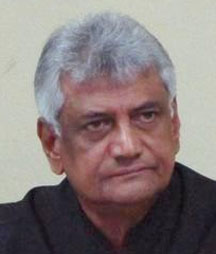The Guyana Elections Commission (GECOM) will review opposition proposals on its draft code of conduct for parties contesting the elections and may incorporate them if “workable” into the final document.
This announcement was made by GECOM Chairman Dr. Steve Surujbally at a press conference yesterday, where he provided an update on the state of preparedness for the November 28 regional and general elections.
The incumbent PPP/C is the only party that has signaled its willingness to sign on to the code, which was circulated for comment to all political parties. Opposition coalition APNU and opposition party AFC have both signaled their reluctance to endorse the code in its draft form, in light of concerns about equitable access to the state media and transparency in campaigning financing.

Surujbally, who admitted that he was unaware of the AFC’s plan to submit amendments and a copy of its own code of conduct to GECOM, said that the commission would welcome it as it currently seeks to finalize the code of conduct. The Chairman also informed that he had met with the APNU on Wednesday and it had also reiterated its concerns.
He made it clear that the code was simply a draft and welcomed proposals from political parties about any concerns.
He noted the importance of a code of conduct in Guyana, since it will set guidelines for proper behavioral practices for all parties during the elections period. The draft code was developed with “the primary objective of encouraging an atmosphere of open free and fair political competition,” he added.
Meanwhile, Surujbally said GECOM would be spending at least US$444,147 on ballot paper and other sensitive material. The commission is preparing to receive parties’ lists of candidates on October 27—Nomination Day—at City Hall. The submission and processing of the lists will also pave the way for members the Joint Services to cast their votes on November 21.
With the continuing leadership divide in The United Force (TUF), Chief Elections Officer Gocool Boodhoo said the faction that arrives first to submit its list would be accepted.
After then, the aggrieved group could seek legal recourse. “The first group to come and would have met the requirements, that‘s the group that will be accepted,” he explained.
So far, 32 political parties have expressed an interest in contesting the polls. But Surujbally said that number could decrease to a “more manageable” figure, as has been customary.
In the run-up to polling day, Boodhoo said special water-marked paper to print the Official List of Electors would be imported from CODE, a reputable company experienced in electoral materials, at a cost of US$85,000. Other materials including ballot paper, Statements of Poll forms, tally sheets and indelible ink would cost US$359,147.
The commission also plans to embark on a massive public education campaign on how members of the electorate should cast their ballots and what is considered a valid or invalid ballot. These would take the form of brochures, infomercials, posters and banners.







